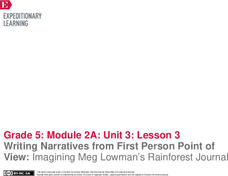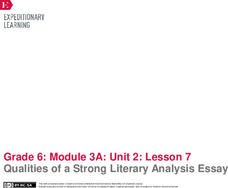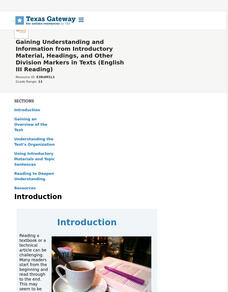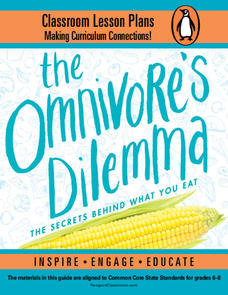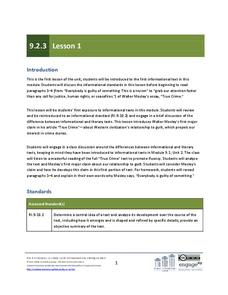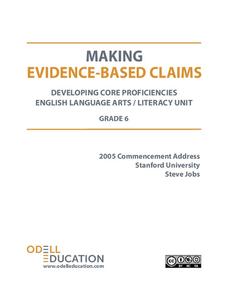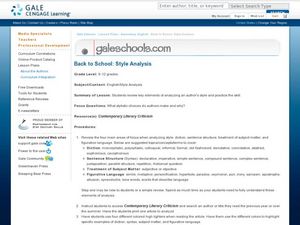EngageNY
Writing Narratives from First Person Point of View: Imagining Meg Lowman’s Rainforest Journal
I spy with my little eye! Learners observe page 23 in The Most Beautiful Roof in the World and practice what they would add to a field journal. They discuss how details from the text help add to their thoughts. To finish, readers use...
EngageNY
Qualities of a Strong Literary Analysis Essay
Read like a writer. Scholars read a model literary analysis in preparation for a similar writing assignment before annotating each paragraph for the gist. Next, pupils devise a list of qualities of a strong literary analysis essay.
K12 Reader
Narrative or Expository?
Narrative or expository? That is the question readers face on a two-part comprehension worksheet that asks kids to read a short passage about these two different types of writing, and then to answer a series of comprehension questions...
Curated OER
Performance-Based Assessment Practice Test (Grade 4 ELA/Literacy)
Track the progress of your fourth graders' reading and writing skills with this practice Common Core assessment. Based on a collection of six reading passages that include narrative stories, poetry, and a series of informational...
Alabama Learning Exchange
The Big Bang Theory: An Evidence-Based Argument
What evidence supports the big bang theory? Individuals analyze scholarly resources about the the theory and develop arguments backed by evidence. They brainstorm, share ideas, watch a video, and read articles to complete a graphic...
Smithsonian Institution
Solomon G. Brown: Letter Writing
Personal correspondence in the form of letters is not as common as it once was. This resource presents an opportunity for you to introduce your class to letter writing and cover topics in social studies. Learners read a letter written in...
K12 Reader
Using Prior Knowledge
Sometimes it's hard to relate to a new text. Teach kids to use their prior knowledge when reading something new with a comprehension exercise. A short passage tells them how to think of their brains like filing systems, and provides five...
Texas Education Agency (TEA)
Gaining Understanding and Information from Introductory Material, Headings, and Other Division Markers in Texts (English III Reading)
All teachers are teachers of reading! The 13-part interactive series ends with a lesson that teaches learners (and their instructors) how to approach reading their textbooks. After learning about several strategies, users test their...
Penguin Books
The Omnivore’s Dilemma, Young Readers Edition
As the saying goes, you are what you eat. A useful set of lesson plans encourage young readers to take a second look at their eating habits. Pre- and post-reading questions bring in reflective writing and discussion while extension...
Curated OER
Writing Formal Letters
Help your young writers recognize the importance of composing formal letters. Middle schoolers read letters written by Thomas Jefferson and analyze the components that make it a formal letter. They will then compose their own letters.
EngageNY
Grade 9 ELA Module 2, Unit 3, Lesson 1
"True-crime stories, murder mysteries, up-to-the-minute online news reports, and (as always) rumor and innuendo grab our attention faster than any call for justice, human rights, or ceasefires." Or so says Walter Mosley in his Newsweek...
EngageNY
Revising the Informative Consumer Guide: Sentence Structure, Transitions, and Works Cited
Transitions are the glue that link paragraphs together. Pupils listen to a mini lesson plan on sentence structure and transitions and use what they learned to revise their informative consumer guides. Next, they self-assess their writing...
Ford's Theatre
How Perspective Shapes Understanding of History
The Boston Massacre may be an iconic event in American history, but perhaps the British soldiers had another point of view. Using primary sources, including reports from Boston newspapers and secondary sources from the British...
K5 Learning
Musical Instruments to Play
Bring some music to your language arts lesson with a reading comprehension activity. Learners read an informational passage about different musical instruments before answering a series of comprehension and vocabulary questions.
Breaking News English
The World Is 0.28% More Peaceful Than a Year Ago
Some days, the world seems like it is becoming darker, but research suggests that the world might actually be becoming a more peaceful place. An informational reading passage accompanied by a series of activities builds English language...
EngageNY
Writing an Argument Essay: Developing Claims and Reasons
Scholars begin working on the end-of-unit writing prompt for Pygmalion. They must analyze their collected text evidence to determine what information is compelling enough to include in their argumentative essays. The teacher guides them...
Odell Education
Making Evidence-Based Claims: Grade 6
In order to make evidence-based claims, one must be able to draw explicit information from text. From here, learners take that information, analyze the text to develop a deeper understanding, and connect with the information in order to...
Curated OER
Determining Author's Point of View: The Sneeches
Determine the author's point of view in a text. Young readers read Dr. Seuss' The Sneeches and identify the author's purpose in the story. They identify persuasive techniques in writing, asking and answering questions to better...
Curated OER
"I Can” Common Core! 6th Grade Writing
It is impossible to know whether one has reached a goal without first knowing the goal. Help your sixth graders reach all the Common Core writing standards by giving them a checklist written in language they will understand. As you teach...
Curated OER
English Lesson Plans for Grade 12
HIgh schoolers respond to a persuasive article on using animal research. In this english lesson, writers listen to a conversation, and discuss the point of arguments. They write a critique on a certain film and share it with their...
Kids Discover
Galaxies by KIDS DISCOVER
An e-magazine with kid-friendly informational text, vibrant visuals, and activities about galaxies.
Scholastic
Prescription Pain Medication: What You Need to Know
The national epidemic of opioid addiction is making its way into high school populations. Educate the young scholars in your class about the ways prescription opioids can both block pain and deliver large amounts of dopamine that make it...
Curated OER
The Movement Before the Movement: Civil Rights Activism in the 1940s
Many educators focus on the civil rights movement as it occurred after Rosa Parks incited the bus boycott. Extend the understanding of the fight for civil rights in the United States with this post-WWII instructional activity. Learners...
Curated OER
Back to School: Style Analysis
Jump back into expository writing and analysis at the start of a new school year! Start with a review of an authors' stylistic choices in diction, syntax, treatment of subject matter, and figurative language. Writers choose a text to...


